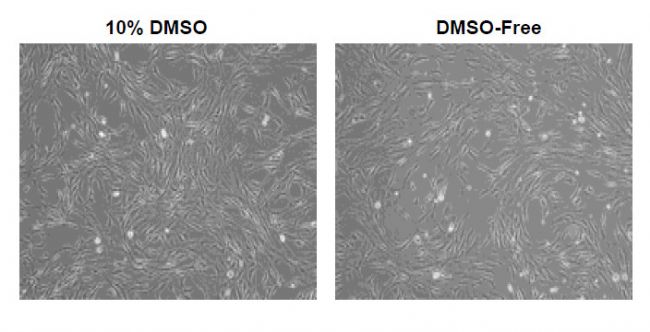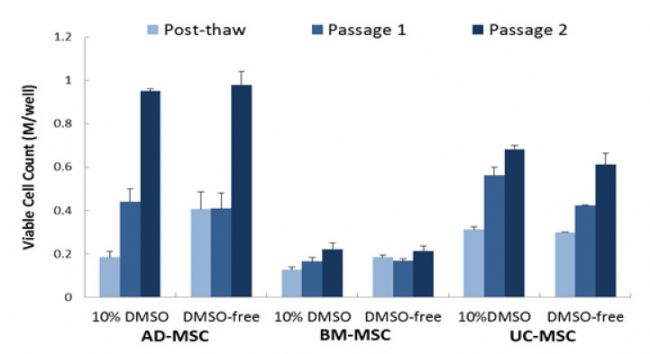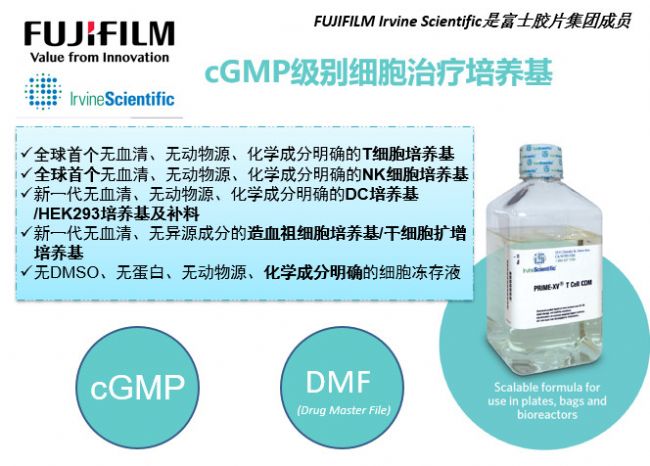Development of serum-free cell cryopreservation solution without DMSO and chemical composition 
Cryogenic protectants such as dimethyl sulfoxide (DMSO), glycerol, and propylene glycol have been widely used for cryopreservation of cells and tissues. DMSO is the most commonly used osmotic cryogen in cell preservation, but it also has some toxicity to cells, which can denature intracellular proteins at room temperature. Adverse reactions caused by DMSO have been confirmed in animal experiments. In some clinical treatment cases, patients who received hematopoietic stem cells containing DMSO showed symptoms such as nausea, headache, high blood pressure, diarrhea, and abdominal cramps. Therefore, cell storage for clinical treatment should minimize the amount of DMSO or replace it with a safer cryoprotectant.
On the other hand, as people pay more and more attention to the possible damage of DMSO to mesenchymal stem cells (MSC) and its differentiation potential, the industry's technicians need a serum-free cell cryopreservation solution completely free of DMSO.
In response to the challenges of cell cryopreservation in the global cell therapy field, FUJIFILM Irvine scientific (a member of the Fujifilm Group), a leading global cell culture product and service provider, has developed a new generation of serum-free cGMP-grade cells for cell therapy. The medium includes the world's first animal-free, chemically-defined T-cell serum-free medium, the world's first animal-free, chemically-defined NK cell serum-free medium for suspension of 203 for efficient viral vector preparation. For serum media and other products , it is worth noting that FUJIFILM Irvine Scientific has also introduced a new animal-free, chemically-defined, protein-free and DMSO- free cell cryopreservation solution for cryopreservation of cells. Serum-free cell cryopreservation is cGMP grade and DMF has been obtained at the FDA, eliminating regulatory concerns in use.
Let's take a look at the test data related to serum-free cryopreservation disclosed by FUJIFILM Irvine Scientific.

In the study, the technicians compared the traditional DMSO cryopreservation solution (containing 10% DMSO) to demonstrate the use of the new DMSO-Free cryopreservation solution (catalogue number 91149-10ml) for human fat sources, bone marrow sources, and umbilical cord sources. Good results of mesenchymal stem cells (AD-MSC, BM-MSC and UC-MSC).
method
Three major MSC cells were expanded with PRIME-XV MSC Expansion XSFM medium (FUJIFILM Irvine Scientific, serum-free mesenchymal stem cell medium, Cat. No. 91149-250 ml) before and after cryopreservation. At the same cell seeding density, MSC cells were frozen in liquid nitrogen for 2 to 5 days with PRIME-XV FreezIS (10% DMSO) and PRIME-XV FreezIS DMSO-Free.
After storage, MSC cells were thawed and serially subcultured twice to assess cell morphology, cell viability, cell marker expression, and cell differentiation potential. Cell marker expression was assessed by flow cytometry using PerCP-Cy5.5 conjugated mouse anti-human CD45, APC conjugated mouse anti-human CD90 and PE conjugated mouse anti-human CD105. Prior to staining, MSC cells were cultured for 2 to 4 weeks in PRIME-XV adipogenic differentiation medium, PRIME-XV osteogenic differentiation medium, and PRIMEXV chondrogenic differentiation medium to determine their differentiation potential.
result
A preliminary difference was observed within 24 hours of cell thawing, and the quality of cells cryopreserved in the absence of DMSO solution was significantly better. Three days after thawing, before passage, we observed a plastic attachment capacity comparable to that of expected MSCs and a morphology similar to that of fibroblasts (Fig. 1).

Figure 1: Morphological comparison of cryopreserved MSC cells in 10% DMSO and DMSO-free cryopreservation solutions. Human adipose derived MSC cells were frozen in a cryopreservation solution containing 10% DMSO and no DMSO. After thawing, the cells were expanded in PRIME-XV MSC medium. Cell attachment and cell morphology were observed. Images are taken at 10X magnification.
After thawing of 10% DMSO and DMSO-free frozen MSC cells, the viable cell count was comparable by two passages until 80% confluence (Figure 2).

 Figure 2: Amplification comparison of cryopreserved MSC cells in 10% DMSO and DMSO-free cryopreservation solutions. After thawing, human adipose derived (AD-MSC), bone marrow derived (BM-MSC) and umbilical cord derived (UC-MSC) cell counts were counted by two passages simultaneously.
All MSC cells were able to proliferate on the surface of fibronectin coated tissue culture plastic equipment and no differences in marker expression were observed. MSC cells that were passaged multiple times maintained positive expression of CD105 and CD90 and were negative for CD45 (Fig. 3).

Figure 3: Multiple passage cells maintain MSC marker expression: CD105 and CD90 positive, CD45 negative. Human adipose derived MSC cells were cultured in PRIME-XV MSC Expansion XSFM medium. Cell marker expression was assessed by flow cytometry.
At the same time, no effect of the cryopreservation solution on the cells was observed. All three types of MSC cells retain multi-lineage differentiation potential. The cells form visible lipid vacuoles that exhibit typical adipogenic differentiation. As expected, the cells also have the ability to continue to maintain osteogenic differentiation. Frozen sections and staining of chondrocyte spheres demonstrated the presence of aggrecan and type II collagen, which is a typical chondrogenic differentiation (Fig. 4).

Figure 4: MSC cells retain the multi-lineage differentiation potential. After thawing, human adipose derived MSC cells were cultured in PRIME-XV MSC Expansion XSFM medium. MSC cells are differentiated into (A) adipocytes, (B) bone cells, and (C) chondrocytes. Cells were stained with (A) FABP-4 (red), (B) OSTEOCALCIN (green) and RUNX2 (red) and (C) AGGRECAN (red) and collagen type II (green). The nuclei were counterstained with DAPI (A and C).
in conclusion
The study found that the performance of the cells was comparable before and after cryopreservation. No significant differences in cell viability, CD105 and CD90 expression were observed. MSCs frozen in DMSO-free cell suspensions continue to retain their differentiation potential.
Overall, the study demonstrated that FUJIFILM Irvine Scientific has successfully developed a new serum-free cell cryopreservation that replaces traditional cryopreservation with DMSO, which is animal-free, protein-free, The characteristics of DMSO-free, so as to ensure the safety of cell cryopreservation during clinical application, to better support the global cell culture industry.
If you are interested in FUJIFILM Irvine Scientific's DMSO-free, animal-free, protein-free, chemically defined cell cryopreservation, or wish to request a free test sample, you can request it by email.

Related Reading
Development and application of a new generation of serum-free cell therapy medium
The world's first animal-free, chemically-defined NK cell culture medium
About FUJIFILM Irvine Scientific
FUJIFILM Irvine Scientific is the world's leading high-tech company specializing in the research and development and production of cell culture products. It continues to serve as a research, industrial customer and clinician in the world of industrial cell culture, assisted reproduction, cell therapy and cytogenetics. Provide high quality, reliable products and flexible, customized and excellent services. The company has always adhered to the strict supervision of international ISO and FDA, and has world-class cGMP dry powder medium production facilities in California and Tokyo, Japan.
FUJIFILM Irvine Scientific has long adhered to the concept of consulting services, and has gained recognition and recognition from customers around the world with more than 45 years of experience and expertise in global cell culture product development, service areas, regulatory compliance, and registration compliance. A global strategic leader in the development and service of culture media.
FUJIFILM Irvine Scientific currently offers a range of cGMP-grade serum-free media in biopharmaceutical and cell therapy worldwide, including CHO cell new generation serum-free, chemically defined media and highly concentrated feeds, a new generation of suspension 293 cells. Medium and CHO transient transfection medium, custom medium development and cGMP grade medium dry powder production service, new generation serum-free, animal-free chemical-defined T cell culture medium and NK cell culture medium, no serum Source of stem cell culture medium and serum-free, chemically defined cell cryopreservation solution, and the like.
Coix seed is sweet in taste and slightly cold in nature. Coix seed not only has edible value, but also has high medicinal value. It is a traditional Chinese medicine. It has the effect of invigorating the spleen and infiltrating dampness. Toxin metabolism, it can improve the body edema and beriberi caused by excessive damp toxin. It also has the effect of removing arthralgia and relieving diarrhea, which can treat damp arthralgia, and has a certain relieving effect on diarrhea due to spleen deficiency, disharmony between the spleen and stomach, and indigestion. Coix seed is slightly cold in nature, can clear heat and expel pus, and is mainly used for lung carbuncle, intestinal carbuncle and other diseases.
Jilin Yomi Agricultural and Sideline Products Import and Export Co.LTD. focusing on building a green base, building a characteristic industrial chain, deepening the channel supply chain, vigorously developing export trade, and leading the development direction of the entire industry; insisting on green development, promoting the concept of health, and making every effort to build a national leading enterprise in the organic grain industry.
Coix Seed,Coix Seed Bulk,Organic Coix Seed,Coix Seed Adalah
Yomifresh , https://www.yomifresh.com